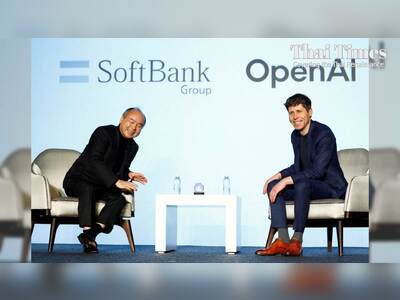
Novo Nordisk Implements Blockchain Solution to Enhance Drug Safety in Thailand
The eZTracker system enables verification of Ozempic® authenticity to combat counterfeit pharmaceuticals.
Novo Nordisk Thailand has introduced a blockchain-based traceability system known as eZTracker to verify the authenticity of its diabetes medication, Ozempic®.
The implementation is part of an initiative aimed at addressing the increasing prevalence of counterfeit drugs that pose significant health risks to patients.
Counterfeit medications can contain harmful substances and are often distributed through unregulated online channels, making enforcement difficult.
The eZTracker solution utilizes a 2D data matrix sticker on each sales pack, allowing for unique identification and traceability of products throughout the supply chain.
This technology has been rolled out specifically for Ozempic® in Thailand and represents a proactive measure to protect patient safety.
Mr. Enrico Cañal Bruland, General Manager of Novo Nordisk Pharma (Thailand) Ltd, emphasized the importance of this initiative, stating, "We remain committed to raising awareness about counterfeit medicines.
Patient safety is our top priority." This collaboration with Zuellig Pharma is designed to not only secure product authenticity but also to empower patients and healthcare professionals in verifying the medications they receive.
Users can confirm the authenticity of Ozempic® by scanning the 2D QR pink sticker or manually entering the product code in the eZTracker app.
A successful scan verifies the product's legitimacy and provides users with additional information.
If a scan fails, it may indicate a counterfeit, prompting users to report such cases via the app.
Mr. Cañal Bruland highlighted this rollout as a significant milestone in efforts to strengthen confidence among healthcare professionals and patients regarding the medications they utilize.
In related news, Thailand is set to adopt the World Intellectual Property Organisation’s (WIPO) Creative Economy Data Model (CEDM) to enhance its creative sectors.
This initiative aims to bolster the country's cultural soft power globally.
The creative economy has emerged as a key factor in economic development, with countries like China capitalizing on their creative industries.
The adoption of WIPO's model will allow Thailand to better evaluate and promote its creativity-driven economic sectors, which generated approximately 1.44 trillion baht and created nearly one million jobs in 2023. Thailand will be the fourth country to pilot this model, joining the Philippines, Kazakhstan, and Trinidad and Tobago.
In the automotive sector, XPENG Thailand has unveiled its latest electric vehicle, the X9 PREMIUM, during the 46th Motor Show running from March 26 to April 6, 2025. The company aims to position itself as a leader in smart driving technology, showcasing its vision for the future of the automotive industry.
The X9 PREMIUM is designed as a sporty electric van that emphasizes multifunctional cabin space.
XPENG’s advancements include the introduction of the Turing AI Chip, a 40-core processor optimized for Level 4 autonomous driving, which significantly enhances processing capabilities.
This chip, in conjunction with the company’s focus on software development, aims to revolutionize the automotive landscape.
The XPENG X9 has already received considerable interest, with over 700 pre-orders since its introduction and first deliveries set to occur in March.
The new X9 offers various technological features, including a spacious interior and optional configurations for seating arrangements.
The vehicle is equipped with an advanced battery architecture and an innovative support system designed for comfort and performance.
Two variants of the X9 are available, with the X9 LUXURY featuring premium materials and high charging capacities, while the X9 PREMIUM offers enhanced versatility at a competitive price point.
The implementation is part of an initiative aimed at addressing the increasing prevalence of counterfeit drugs that pose significant health risks to patients.
Counterfeit medications can contain harmful substances and are often distributed through unregulated online channels, making enforcement difficult.
The eZTracker solution utilizes a 2D data matrix sticker on each sales pack, allowing for unique identification and traceability of products throughout the supply chain.
This technology has been rolled out specifically for Ozempic® in Thailand and represents a proactive measure to protect patient safety.
Mr. Enrico Cañal Bruland, General Manager of Novo Nordisk Pharma (Thailand) Ltd, emphasized the importance of this initiative, stating, "We remain committed to raising awareness about counterfeit medicines.
Patient safety is our top priority." This collaboration with Zuellig Pharma is designed to not only secure product authenticity but also to empower patients and healthcare professionals in verifying the medications they receive.
Users can confirm the authenticity of Ozempic® by scanning the 2D QR pink sticker or manually entering the product code in the eZTracker app.
A successful scan verifies the product's legitimacy and provides users with additional information.
If a scan fails, it may indicate a counterfeit, prompting users to report such cases via the app.
Mr. Cañal Bruland highlighted this rollout as a significant milestone in efforts to strengthen confidence among healthcare professionals and patients regarding the medications they utilize.
In related news, Thailand is set to adopt the World Intellectual Property Organisation’s (WIPO) Creative Economy Data Model (CEDM) to enhance its creative sectors.
This initiative aims to bolster the country's cultural soft power globally.
The creative economy has emerged as a key factor in economic development, with countries like China capitalizing on their creative industries.
The adoption of WIPO's model will allow Thailand to better evaluate and promote its creativity-driven economic sectors, which generated approximately 1.44 trillion baht and created nearly one million jobs in 2023. Thailand will be the fourth country to pilot this model, joining the Philippines, Kazakhstan, and Trinidad and Tobago.
In the automotive sector, XPENG Thailand has unveiled its latest electric vehicle, the X9 PREMIUM, during the 46th Motor Show running from March 26 to April 6, 2025. The company aims to position itself as a leader in smart driving technology, showcasing its vision for the future of the automotive industry.
The X9 PREMIUM is designed as a sporty electric van that emphasizes multifunctional cabin space.
XPENG’s advancements include the introduction of the Turing AI Chip, a 40-core processor optimized for Level 4 autonomous driving, which significantly enhances processing capabilities.
This chip, in conjunction with the company’s focus on software development, aims to revolutionize the automotive landscape.
The XPENG X9 has already received considerable interest, with over 700 pre-orders since its introduction and first deliveries set to occur in March.
The new X9 offers various technological features, including a spacious interior and optional configurations for seating arrangements.
The vehicle is equipped with an advanced battery architecture and an innovative support system designed for comfort and performance.
Two variants of the X9 are available, with the X9 LUXURY featuring premium materials and high charging capacities, while the X9 PREMIUM offers enhanced versatility at a competitive price point.











